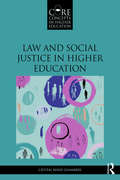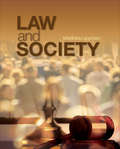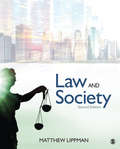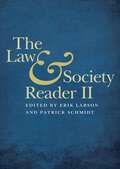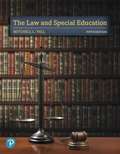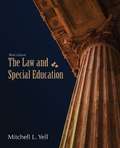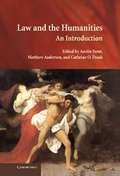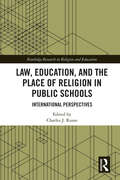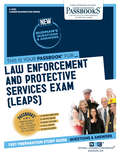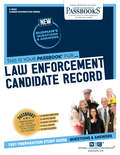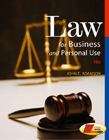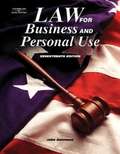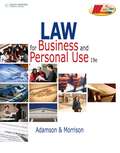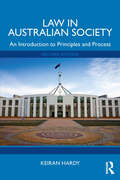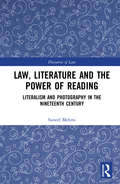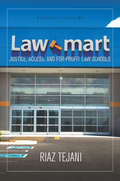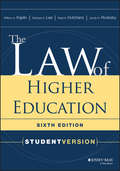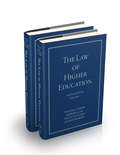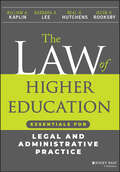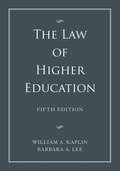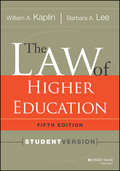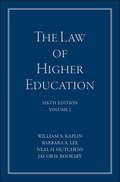- Table View
- List View
Law and Social Justice in Higher Education (Core Concepts in Higher Education)
by Crystal Renée ChambersThe latest volume in the Core Concepts in Higher Education series explores the complexity of law in higher education and both the limits and opportunities of how law can promote inclusivity and access on campus. Through a historical and legal framework, this volume discusses undergraduate students' histories of inclusion and struggles for social justice in higher education by race, sex, social class, dis/ability, and sexual orientation. Bridging research, theory, and practice, Law and Social Justice in Higher Education encourages future and current higher education and student affairs practitioners to consider how they can collaborate to further a just society. Special features: Discussion of case law illustrates the reach and limits of law and where higher education professionals can continue to push for social justice. Accessible to non-lawyers, chapters highlight key legal terms and key concepts to guide readers at the beginning of each chapter. End-of-chapter questions provide prompts for discussion and encourage student interactivity.
Law and Society
by Matthew LippmanLaw and Society offers a contemporary yet concise description of the structure and function of legal institutions, along with a lively discussion of both criminal and civil law, as well as basic legal doctrine. Unlike comparable books on law and society available today, Matthew Lippman takes an interdisciplinary approach to integrate distinctive coverage of diversity, inequality, and globalism through an organized theme in a strong narrative. This practical and invigorating text provides readers with a better understanding of the connection between law and society and the impact recent literature on crime, justice, international human rights, and law has had to promote that connection.
Law and Society
by Matthew Lippman“This is a well-rounded book that seems more interesting to students than other books I have used. It provides information on some cutting-edge themes in law and society while staying well grounded in the theories used by law and society practitioners.” —Lydia Brashear Tiede, Associate Professor, University of Houston Law and Society, Second Edition, offers a contemporary, concise overview of the structure and function of legal institutions, along with a lively discussion of both criminal and civil law and their impact on society. Unlike other books on law and society, Matthew Lippman takes an interdisciplinary approach that highlights the relevance of the law throughout our society. Distinctive coverage of diversity, inequality, civil liberties, and globalism is intertwined through an organized theme in a strong narrative. The highly anticipated Second Edition of this practical and invigorating text introduces students to both the influence of law on society and the influence of society on the law. Discussions of the pressing issues facing today’s society include key topics such as the law and inequality, international human rights, privacy and surveillance, and law and social control. Log in at study.sagepub.com/lippmanls2e for additional teaching and learning tools.
Law and Society
by Matthew Lippman“This is a well-rounded book that seems more interesting to students than other books I have used. It provides information on some cutting-edge themes in law and society while staying well grounded in the theories used by law and society practitioners.” —Lydia Brashear Tiede, Associate Professor, University of Houston Law and Society, Second Edition, offers a contemporary, concise overview of the structure and function of legal institutions, along with a lively discussion of both criminal and civil law and their impact on society. Unlike other books on law and society, Matthew Lippman takes an interdisciplinary approach that highlights the relevance of the law throughout our society. Distinctive coverage of diversity, inequality, civil liberties, and globalism is intertwined through an organized theme in a strong narrative. The highly anticipated Second Edition of this practical and invigorating text introduces students to both the influence of law on society and the influence of society on the law. Discussions of the pressing issues facing today’s society include key topics such as the law and inequality, international human rights, privacy and surveillance, and law and social control. Log in at study.sagepub.com/lippmanls2e for additional teaching and learning tools.
The Law and Society Reader II (Washington Mews)
by Erik Larson Patrick SchmidtLaw and society scholars challenge thecommon belief that law is simply a neutral tool by which society sets standardsand resolves disputes. Decades of research shows how much the nature ofcommunities, organizations, and the people inhabiting them affect how lawworks. Just as much, law shapes beliefs, behaviors, and wider socialstructures, but the connections are much more nuanced—and surprising—than manyexpect.Law and SocietyReader IIprovides readers an accessible overview to the breadth of recent developmentsin this research tradition, bringing to life the developments in this dynamicfield. Following up a first Law andSociety Reader published in 1995, editors Erik W. Larson and Patrick D.Schmidt have compiled excerpts of 43 illuminating articles published since 1993in The Law & Society Review, theflagship journal of the Law and Society Association.By its organizationand approach, this volume enables readers to join in discussing the key ideasof law and society research. The selections highlight the core insights anddevelopments in this research tradition, making these works indispensable forthose exploring the field and ideal for classroom use. Across sixconcisely-introduced sections, this volume analyzes inequality, lawyering, therelation between law and organizations, and the place of law in relation toother social institutions.
The Law And Special Education
by Mitchell YellHelp educators understand the historical and current legal issues in special education The Law and Special Education helps teachers and educational administrators understand their legal obligations relative to providing a free, appropriate public education for students with disabilities. Clear, straightforward, and very accessible, this indispensable resource (1) walks readers through the history and current developments of special education law and (2) gives educators the information and the tools they need to develop legally sound and educationally appropriate special education programs. <p><p> The 5th Edition is updated to keep readers informed of the latest developments and refinements in special education law, including: the Supreme Court rulings in the Endrew F. v. Douglas County Schools and Fry v. Napoleon Community Schools cases; new U.S. Department of Education policy letters and cases; updated coverage of the Every Student Succeeds Act of 2015; new coverage of charter schools and students with disabilities; IEP implementation cases; and a new section on standards-based IEP.
The Law and Special Education (Third Edition)
by Mitchell L. YellIn the highly litigated area of Special Education, it is imperative that professionals in the field understand the legal requirements of providing a free appropriate public education to students with disabilities. This indispensable textbook prepares the reader with the essential skills to locate pertinent information in law libraries, on the Internet, and other sources to keep abreast of the constant changes and developments in the field. Now in the third edition, the entire textbook has been thoroughly updated and revised with the latest information on the statutes, regulations, policy guidance, and cases on special education law, as well as the most current information on: the Individuals with Disabilities Education Act, Section 504 of the Rehabilitation Act and the Elementary and Secondary Education Act, The Family Educational Rights and Privacy Act (FERPA), and the Health Insurance Portability and Accountability Act (HIPAA). Long-recognized as one of the top special education law books in the field, The Law and Special Education, Third Edition, presents the most important and necessary information for educators to understand the history and development of special education laws and the requirements of these laws in the field of special education.
Law and the Humanities
by Austin Sarat Matthew Anderson Cathrine O. FrankLaw and the Humanities: An Introduction brings together a distinguished group of scholars from law schools and an array of the disciplines in the humanities. Contributors come from the United States and abroad in recognition of the global reach of this field. This book is, at one and the same time, a stock taking both of different national traditions and of the various modes and subjects of law and humanities scholarship. It is also an effort to chart future directions for the field. By reviewing and analyzing existing scholarship and providing thematic content and distinctive arguments, it offers to its readers both a resource and a provocation. Thus, Law and the Humanities marks the maturation of this "law and" enterprise and will spur its further development.
Law, Education, and the Place of Religion in Public Schools: International Perspectives (Routledge Research in Religion and Education)
by Charles J. RussoThis text presents a comparative, cross-cultural analysis of the legal status of religion in public education in eighteen different nations while offering recommendations for the future improvement of religious education in public schools. Offering rich, analytical insights from a range of renowned scholars with expertise in law, education, and religion, this volume provides detailed consideration of legal complexities impacting the place of religion and religious education in public education. The volume pays attention to issues of national and international relevance including the separation of the church and state; public funding of religious education; the accommodation of students’ devotional needs; and compulsory religious education. The volume thus highlights the increasingly complex interplay of religion, law, and education in diverse educational settings and cultures across developing and developed nations. Providing a valuable contribution to the field of religious secondary education research, this volume will be of interest to researchers, academics, and educators with an interest in religion and law, international and comparative education, and those involved with educational policy at all levels. Those more broadly interested in moral and values education will also benefit from the discussions the book contains.
Law, Education, and the Place of Religion in Public Schools: International Perspectives (Routledge Research in Religion and Education)
by Charles J. RussoThis text presents a comparative, cross-cultural analysis of the legal status of religion in public education in eighteen different nations while offering recommendations for the future improvement of religious education in public schools. Offering rich, analytical insights from a range of renowned scholars with expertise in law, education, and religion, this volume provides detailed consideration of legal complexities impacting the place of religion and religious education in public education. The volume pays attention to issues of national and international relevance including the separation of the church and state; public funding of religious education; the accommodation of students’ devotional needs; and compulsory religious education. The volume thus highlights the increasingly complex interplay of religion, law, and education in diverse educational settings and cultures across developing and developed nations.Providing a valuable contribution to the field of religious secondary education research, this volume will be of interest to researchers, academics, and educators with an interest in religion and law, international and comparative education, and those involved with educational policy at all levels. Those more broadly interested in moral and values education will also benefit from the discussions the book contains.
Law Enforcement and Protective Services Exam: Passbooks Study Guide (Career Examination Series)
by National Learning CorporationThe Law Enforcement and Protective Services Exam (LEAPS) Passbook® prepares you for your test by allowing you to take practice exams in the subjects you need to study. It provides hundreds of questions and answers in the areas that will likely be covered on your upcoming exam.
Law Enforcement Candidate Record: Passbooks Study Guide (Career Examination Series #C-3600)
by National Learning CorporationThe Law Enforcement Candidate Record Passbook® prepares you for your test by allowing you to take practice exams in the subjects you need to study. It provides hundreds of questions and answers in the areas that will likely be covered on your upcoming exam, including but not limited to: personality inventory; judgment in police situations; legal knowledge; reading comprehension; arithmetical reasoning; and more.
Law for Business and Personal Use
by John E. AdamsonAdamson (business, Southwest Missouri State University) outlines the U. S. legal system and explains how various laws apply to the rights and duties of small businesses. The 32 chapters discuss civil procedure, contract law, leasing of real property, wills and trusts, employment law, legal forms of business organization, and financial transactions. Annotation ©2006 Book News, Inc. , Portland, OR (booknews. com)
Law for Business and Personal Use
by John E. AdamsonAdamson (business, Southwest Missouri State University) outlines the U. S. legal system and explains how various laws apply to the rights and duties of small businesses. The 32 chapters discuss civil procedure, contract law, leasing of real property, wills and trusts, employment law, legal forms of business organization, and financial transactions. Annotation ©2006 Book News, Inc. , Portland, OR (booknews. com)
Law for Business and Personal Use
by John E. Adamson Amanda MorrisonLAW FOR BUSINES AND PERSONAL USE, 19E provides instruction on the foundations of business law as well as the application of legal concepts to everyday life.
Law in Australian Society: An Introduction to Principles and Process
by Keiran HardyWhat is the ‘rule of law'? How do laws get made? Does our legal and political system achieve justice for all Australians equally? Designed for beginners as well as non-law students, this textbook provides a comprehensive and accessible guide to understanding Australia's system of law and government.Law in Australian Society explains legislation and case law, courts, and the doctrine of precedent. Keiran Hardy examines the roles played by parliaments, politics, and the media. He explains founding principles, including democracy, liberalism, the separation of powers, and federalism. Human rights and justice are highlighted, with an emphasis on First Nations Peoples and the law. The book explains criminal responsibility and the justice system, including police powers and the criminal trial. It concludes with case studies of cybercrime and counterterrorism laws to illustrate law reform in action. This second edition has been fully updated throughout, including recent legislation, cases, and topical issues from Australian law and politics, including from the COVID-19 pandemic and the recent referendum on an Indigenous Voice to Parliament. Each chapter features practical examples, chapter summaries and review questions together with a glossary of key terms. Concise, accessible and up-to-the-minute, this is a vital guide for anyone seeking to understand Australian law and government.
Law, Literature and the Power of Reading: Literalism and Photography in the Nineteenth Century
by Suneel MehmiAt the intersection of law, literature and history, this book interrogates how a dominant contemporary idea of law emerged out of specific ideas of reading in the nineteenth century. Reading shapes our identities. How we read shapes who we are. Reading also shapes our conceptions of what the law is, because the law is also a practice of reading. Focusing on the works of key Victorian writers closely associated with legal practice, this book addresses the way in which the identity of the reader of law has been modelled on the identity of the political elite. At the same time, it shows how other readers of law have been marginalized. The book thus shows how a construction of the law has emerged from the ordering of a power that discriminates between different readers and readings. More specifically, and in response to the emerging media of photography – and, with it, potentially subversive ideas of exposure and visibility – the book shows that there have been dominant, hidden and unrecognised guides to legal reading and to legal thought. And in making these visible, the book also aims to make them contestable. This secret history of law will appeal to legal historians, legal theorists, those working at the intersection of law and literature and others with interests in law and the visual.
Law Mart: Justice, Access, and For-Profit Law Schools
by Riaz TejaniAmerican law schools are in deep crisis. Enrollment is down, student loan debt is up, and the profession's supply of high-paying jobs is shrinking. Meanwhile, thousands of graduates remain underemployed while the legal needs of low-income communities go substantially unmet. Many blame overregulation and seek a "free" market to solve the problem, but this has already been tested. Seizing on a deregulatory policy shift at the American Bar Association, private equity financiers established the first for-profit law schools in the early 2000s with the stated mission to increase access to justice by "serving the underserved". Pursuing this mission at a feverish rate of growth, they offered the promise of professional upward mobility through high-tech, simplified teaching and learning. In Law Mart, a vivid ethnography of one such environment, Riaz Tejani argues that the rise of for-profit law schools shows the limits of a market-based solution to American access to justice. Building on theories in law, political economy, and moral anthropology, Tejani reveals how for-profit law schools marketed themselves directly to ethnoracial and socioeconomic "minority" communities, relaxed admission standards, increased diversity, shook up established curricula, and saw student success rates plummet. They contributed to a dramatic rise in U.S. law student debt burdens while charging premium tuition financed up-front through federal loans over time. If economic theories have so influenced legal scholarship, what happens when they come to shape law school transactions, governance, and oversight? For students promised professional citizenship by these institutions, is there a need for protections that better uphold institutional quality and sustainability? Offering an unprecedented glimpse of this landscape, Law Mart is a colorful foray into these essential questions.
The Law Of Disability Discrimination For Higher Educational Professionals
by Ruth Colker Paul GrossmanThe purpose of The Law of Disability Discrimination for Higher Education Professionals is to provide an in-depth understanding of the ADA and related statutes to the many individuals who are responsible for disability equality in higher education: disabled student services directors, ADA officers, house and contract counsel, human resource directors, college grievances officers, ombudspersons, federal and state compliance agents, organizational advocates, health and counseling service personnel, deans and faculty, etc.
The Law of Higher Education: Student Version (The\jossey-bass Higher And Adult Education Ser.)
by William A. Kaplin Barbara A. Lee Neal H. Hutchens Jacob H. RooksbyA single-volume text that distills information for students Based on the sixth edition of Kaplin and Lee’s indispensable guide to the law that bears on the conduct of higher education, The Law of Higher Education, Sixth Edition: Student Version provides an up-to-date reference and guide for coursework in higher education law and programs preparing law students and higher education administrators for leadership roles. This student edition discusses the most significant areas of the law for college and university attorneys and administrators. Each chapter is introduced by a discussion of key terms and topics the students will encounter, and the book includes materials from the full sixth edition that are most relevant to student interests and classroom instruction. It also contains a “crosswalk” that keys sections of the Student Edition to counterpart sections of the two-volume treatise. Complements the full version Includes a glossary of legal terms and an appendix on how to read legal material for students without legal training Discusses key terms in each chapter Concentrates on key topics students will need to know This is fundamental reading for law students preparing for careers in higher education law and for graduate students in higher education administration programs.
The Law of Higher Education: Student Version (The\jossey-bass Higher And Adult Education Ser.)
by William A. Kaplin Barbara A. Lee Neal H. Hutchens Jacob H. RooksbyYour must-have resource on the law of higher education Written by recognized experts in the field, the latest edition of The Law of Higher Education offers college administrators, legal counsel, and researchers with the most up-to-date, comprehensive coverage of the legal implications of administrative decision making. In the increasingly litigious environment of higher education, William A. Kaplin and Barbara A. Lee's clear, cogent, and contextualized legal guide proves more and more indispensable every year. Two new authors, Neal H. Hutchens and Jacob H Rooksby, have joined the Kaplin and Lee team to provide additional coverage of important developments in higher education law. From hate speech to student suicide, from intellectual property developments to issues involving FERPA, this comprehensive resource helps ensure you're ready for anything that may come your way. Includes new material since publication of the previous edition Covers Title IX developments and intellectual property Explores new protections for gay and transgender students and employees Delves into free speech rights of faculty and students in public universities Expands the discussion of faculty academic freedom, student academic freedom, and institutional academic freedom If this book isn't on your shelf, it needs to be.
The Law of Higher Education: Essentials for Legal and Administrative Practice
by Barbara A. Lee William A. Kaplin Jacob H. Rooksby Neal H. HutchensA comprehensive, up-to-date reference for higher education law faculty, administrators, counsel, and students This revised 7th Edition of The Law of Higher Education: Essentials for Legal and Administrative Practice offers updated information, analysis, and practical suggestions on a full range of legal issues pertinent to both public and private institutions. As a guide for coursework in programs preparing higher education lawyers and administrators for leadership roles, and as a reference for professionals in those fields, this book is essential for both students and practitioners. Covering the latest changes to laws in higher education, the 7th edition gives readers the most current possible understanding of higher education law. The book also contains a glossary of key terms and an appendix on how to read legal material for the non-law student. Each chapter is introduced by a discussion of key terms and ideas the reader will encounter. The book thoroughly addresses the most important contemporary issues in education law: free speech, Title IX, academic freedom, institutional tort liability, racial harassment, employment discrimination, disability and reasonable accommodation, campus security, and student organizations are among the key topics that readers will come to understand in depth. There have been substantial recent changes in the laws governing these issues, and practitioners will need the updated content in this book to remain conversant in todays' higher education law and policy. Gain a thorough understanding of the central topics in higher education law, including free speech, nondiscrimination, religious free exercise, and many others Review the latest changes to federal laws governing colleges and universities Reference a glossary of terms, statute index, and other convenient features Learn about the American court system and how to read and analyze court opinions The Law of Higher Education: Essentials for Legal and Administrative Practice is indispensable for anyone studying higher education administration, preparing for a career in higher education law, or seeking to learn more about law in higher education.
The Law of Higher Education, 2 Volume Set
by William A. Kaplin Barbara A. LeeMake sure you have a copy on your bookshelf.The Law of Higher Education, Fifth Edition, is the most up-to-date and comprehensive reference, research source, and practical legal guide for college and university administrators, campus attorneys, legal counsel, and institutional researchers, addressing all the major legal issues and regulatory developments in higher education.In the increasingly litigious environment of higher education, William A. Kaplin and Barbara A. Lee's clear, cogent, and contextualized legal guide proves more and more indispensable every year.Over 3,000 new cases related to higher education have been decided since the publication of the previous edition, and scores of changes to higher education law are made each year. Every section of the fifth edition contains new material, including those related to:Hate speech and free speech rights of faculty in public universitiesSharing of research with international colleaguesIntellectual property and peer-to-peer file sharingStudent suicideCampus safetyPolice and administrators' right to search students' residence hall roomsGovernmental support for religious institutions and religious autonomy rights of individual public institutionsCollective bargaining and antidiscrimination lawsNondiscrimination and affirmative action in employment, admissions, and financial aidFamily and Medical Leave Act and workers' compensationFERPA (Family Educational Rights and Privacy Act)
The Law of Higher Education, 5th Edition
by Barbara A. Lee William A. KaplinBased on the fifth edition of the indispensable guide to the laws that bear on the conduct of higher education, this student edition provides an up-to-date textbook, reference, and guide for coursework in higher education law and programs preparing higher education administrators for leadership roles. This student edition contains a glossary of key terms and an appendix on how to read legal material for the non-law student. Each chapter is introduced by a discussion of key terms and ideas the students will encounter.
The Law of Higher Education, A Comprehensive Guide to Legal Implications of Administrative Decision Making: Student Version (The\jossey-bass Higher And Adult Education Ser.)
by William A. Kaplin Barbara A. Lee Neal H. Hutchens Jacob H. RooksbyYour must-have resource on the law of higher education Written by recognized experts in the field, the latest edition of The Law of Higher Education, Vol. 2 offers college administrators, legal counsel, and researchers with the most up-to-date, comprehensive coverage of the legal implications of administrative decision making. In the increasingly litigious environment of higher education, William A. Kaplin and Barbara A. Lee’s clear, cogent, and contextualized legal guide proves more and more indispensable every year. Two new authors, Neal H. Hutchens and Jacob H Rooksby, have joined the Kaplin and Lee team to provide additional coverage of important developments in higher education law. From hate speech to student suicide, from intellectual property developments to issues involving FERPA, this comprehensive resource helps ensure you’re ready for anything that may come your way. Includes new material since publication of the previous edition Covers Title IX developments and intellectual property Explores new protections for gay and transgender students and employees Delves into free speech rights of faculty and students in public universities Expands the discussion of faculty academic freedom, student academic freedom, and institutional academic freedom Part of a 2 volume set If this book isn’t on your shelf, it needs to be.
